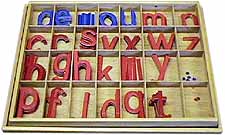Large Movable Alphabet
Introduction
PLACE IN THE CURRICULUM:
- When the child has learned the phonetic sounds of the alphabet
and knows the letters by sight and has listened for the sound
in words when learning them, he is ready to build words with
the large movable alphabet.
MATERIAL:
- A large box with 28 compartments, one for each letter of
the alphabet and two extra which can be used for the dots of
the 'i's" and "j's." The box contains stiff cut-out
letters. The vowels are blue and the consonants are red. Script
letters are used to accustom the child to print. He does not
feel these letters, so the cursive need not be used here.
-
- A large green felt mat.
-

PURPOSE:
- Analysis of phonetic words as a preparation for reading,
writing and spelling.
PRESENTATION 1: Finding Sounds with Large Movable Alphabet
- This exercise is best done with 3-4 children who are all
at the same stage.
-
- The teacher spreads a large green mat on the floor. She opens
the box of letters and puts the box in the lid, in front of the
children. She lets the children look at the letters for a minute
and then, in order to get them used to the material, she asks
for various letters by sound. "Can someone find 't'?"
"Put 'c' on the mat." "Find 'm.'" Each time
the teacher says a letter, all the children look for it until
someone finds it and puts it on the mat.

- The children do not take turns; everyone tries to find the
letters. When the children have had enough practice in finding
the letters, they all help to replace into the box those taken
out.
-
PRESENTATION 2: Building Words with Large Movable Alphabet
- The same day, if there is time (otherwise, the following
day), the teacher may proceed to word building. The material
is arranged as before. The same group of children take part.
The teacher tells them, "We are going to make words."
She chooses three-letter phonetic words. She says, for example,
"We are going to make bat. What
 sounds can you hear
when I say "bat?" The teacher will accept them in any
order and will show the children how to place them on the mat
to make the word "bat."
sounds can you hear
when I say "bat?" The teacher will accept them in any
order and will show the children how to place them on the mat
to make the word "bat."
-
- "What sounds can you hear when I say bat?" A child
may say the sound "b." "Yes, someone find 'b.'"
A child finds "b" and is shown where to put it on the
mat. "What else do you hear in bat? The teacher keeps on
prompting in this fashion until the word is built on the mat.
The teacher then reads the word back to the group a few times,
the sound of each letter pronounced individually and then as
a whole word. "We have made b-a-t, bat. Now, we will make
pig. What sounds do you hear when I say pig?" The lesson
continues in this way. A number of three-letter phonetic words
are suggested by the teacher and the children build them.
-
- This group lesson is repeated on subsequent days.



 sounds can you hear
when I say "bat?" The teacher will accept them in any
order and will show the children how to place them on the mat
to make the word "bat."
sounds can you hear
when I say "bat?" The teacher will accept them in any
order and will show the children how to place them on the mat
to make the word "bat."